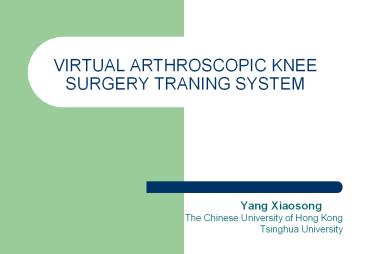VIRTUAL ARTHROSCOPIC KNEE SURGERY TRANING SYSTEM - PowerPoint PPT Presentation
Title:
VIRTUAL ARTHROSCOPIC KNEE SURGERY TRANING SYSTEM
Description:
VIRTUAL ARTHROSCOPIC KNEE SURGERY TRANING SYSTEM Yang Xiaosong The Chinese University of Hong Kong Tsinghua University VIRTUAL ARTHROSCOPIC KNEE SURGERY TRANING ... – PowerPoint PPT presentation
Number of Views:77
Avg rating:3.0/5.0
Title: VIRTUAL ARTHROSCOPIC KNEE SURGERY TRANING SYSTEM
1
VIRTUAL ARTHROSCOPIC KNEE SURGERY TRANING SYSTEM
- Yang Xiaosong
- The Chinese University of Hong Kong
- Tsinghua University
2
VIRTUAL ARTHROSCOPIC KNEE SURGERY TRANING SYSTEM
- A joint project between
- the Chinese University of Hong Kong
- Tsinghua University,
- sponsored by
- The National Natural Science Foundation of China
RGC of Hong Kong
3
Minimally Invasive Microsurgical Technique
- Less trauma
- Reduced pain
- Quicker convalescence
4
Restrictions of Arthroscopy
- Restricted vision
- Poor hand-eye coordination
- Limited mobility of surgical instruments
5
Surgical Skill Training
- Animals
- Cadavers
- Virtual reality based simulation systems
6
Arthroscopy Surgery
7
Virtual Arthroscopic Knee Surgery Training System
- Modeling using data from Visible Human Project
- Simulation of the deformation of soft tissue with
topological change by FEA - User interaction
- Force feedback
8
Hardware System Architecture
Central Computer (PIV 1.5G, Nivdia Geforce 3,
Windows 2000)
Input Device
Display Screen
9
Software System Architecture
10
Mesh Generation of Human Organs
- Segmentation
- Surface boundary meshes creation
- Tetrahedral mesh generation
- Mesh smoothing
11
Collision Detection
- Prevent the arthroscope and operation facility
from entering a solid object - Get the initial intersection point for cutting
simulation - Collision detection for deformable objects,
different from that of rigid objects - AABB tree
12
Simulation of Soft Tissue Deformation With
Flexible Cutting
- Physically reality
- Real-time interaction
Hybrid Finite Element Method
13
Hybrid FEM
- Non-linear deformation and topology changing
model in operating region (Region 1). - The local small region, fast to compute
- Linear deformation and topology constant model in
non-operating region (Region 2) - The remaining large region, accelerated by
pre-processing
14
2-Dimension Sample
15
Cutting of a single element
Degeneration cases
Normal Cases
16
3-Dimension Example
- A simplified model of thigh
- Tetrahedral meshes simplification
17
Input Device
- Four DOFs for arthroscope and instruments
- Pitch
- Yaw
- Insertion
- Rotation
- Force feedback
- Three DC motors attached for the first three DOF
- The fourth DOF need no force feedback
18
Input Device Picture
19
System Interface
20
Sample
21
Work to do
- More effective interactive 3-D segmentation
system - Realistic Rendering
- Simulation of complicated operation facilities
22
Tetrahedral Mesh Generation of Human Organs on
Segmented Volume
23
Tetrahedralization Algorithm on Segmented Volume
- Voxel-Split tetrahedralization
- 3D conforming Delaunay tetrahedralization
algorithm - Feature point based tetrahedralization
24
Voxel-Split tetrahedralization
25
Voxel-Split tetrahedralization
26
Voxel-Split tetrahedralization
27
Voxel-Split tetrahedralization
28
Voxel-Split tetrahedralization
- Simplification of Segmentation Volume
29
Voxel-Split tetrahedralization
- Global Simplification of Segmentation Volume
- Boundary voxel decomposition
- The order of voxel merge
30
3D conforming Delaunay tetrahedralization
algorithm
31
Tissue boundaryextraction
32
3D conforming Delaunay tetrahedralization
algorithm
33
Feature point based tetrahedralization
- Accurate.
- Small scale.
- Well-shaped.
34
Feature point based tetrahedralization
- Placement of the mesh vertices
- Delaunay Triangulation
- Restore the tissue boundary and set element































